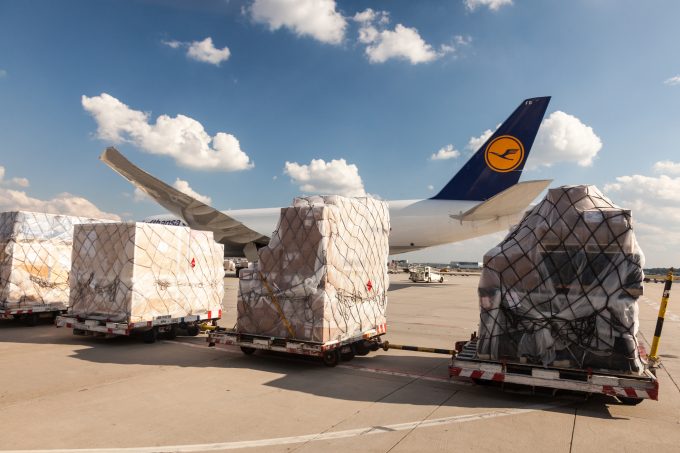Air cargo spot rates hit 2024 peak, while Vietnam becomes a hotspot
Air cargo spot rates have risen to their highest level this year, despite the recent ...
GM: RAISING THE ROOF GGM: IN FULL THROTTLE GZIM: MAERSK BOOST KNIN: READ-ACROSSMAERSK: NOT ENOUGHMAERSK: GUIDANCE UPGRADEZIM: ROLLERCOASTERCAT: HEAVY DUTYMAERSK: CATCHING UP PG: DESTOCKING PATTERNSPG: HEALTH CHECKWTC: THE FALLGXO: DEFENSIVE FWRD: RALLYING ON TAKEOVER TALKODFL: STEADY YIELDVW: NEW MODEL NEEDEDWTC: TAKING PROFIT
GM: RAISING THE ROOF GGM: IN FULL THROTTLE GZIM: MAERSK BOOST KNIN: READ-ACROSSMAERSK: NOT ENOUGHMAERSK: GUIDANCE UPGRADEZIM: ROLLERCOASTERCAT: HEAVY DUTYMAERSK: CATCHING UP PG: DESTOCKING PATTERNSPG: HEALTH CHECKWTC: THE FALLGXO: DEFENSIVE FWRD: RALLYING ON TAKEOVER TALKODFL: STEADY YIELDVW: NEW MODEL NEEDEDWTC: TAKING PROFIT

Lufthansa Cargo is set to add new products to its portfolio to boost its standard freight segment. The strike-hit carrier, which last week announced that earnings had fallen 40% in 2015, said it also needed to restore its reputation as a premium, and therefore reliable, brand.
The carrier saw total revenues fall 3.3% to €2.3bn, while earnings were €73.5m. The strikes lost the carrier €13m in direct costs, but the actual cost was expected to be much higher, as forwarders were thought to have taken volumes to rivals, fearful of lack of reliability.
“Strikes are an inconvenience for our customers,” said Martin Schmitt, CFO. “It hurts us as our brand is a reliable carrier and we have to work hard to regain this reputation. Premium means being on time.”
He was unable to put a cost on the impact – and Lufthansa’s management could give no guarantees for a strike-free year in 2016. “Negotiations are still going on,” said Dr Schmitt.
While Lufthansa Cargo’s yields remained higher than the market average, and the carrier saw growth in volumes for all its products, it also saw declines in standard freight, which it plans to address.
It is launching two products this year. MyAirCargo is a service for individuals who want to ship personal items. Lufthansa will partner with forwarders to offer a door-to-door service. The product is currently under trial with staff, and will be marketed to Lufthansa passengers in the summer.
The product could be a good fit for filling the bellies from passenger-focused destinations. Lufthansa Cargo has been tasked with selling the long haul belly space of Eurowings – which flies to leisure destinations such as the Caribbean and Thai islands, from Cologne.
While the carrier is remaining tight-lipped about a second new product, to be launched in the middle of the year, it indicated that it could be an economic general cargo option.
“Maybe we neglected a part of out product portfolio,” said CEO Peter Gerber. “So there will be a product that’s ‘under’ our standard product.”
The carrier will continue to try to remove costs under its Cargo 2020 plan which will see it reduce annual costs by €40m by 2018. But the market remains a concern.
“I am not positive about the current market situation,” said Mr Gerber. “And it’s getting more difficult. 2015 was a very challenging year, a rollercoaster.”
Noting that the growth in capacity across the industry was 6% last year, while demand growth was just 2.5%, Mr Gerber said the carrier was strengthening its position on the north Atlantic through its proposed joint venture with United, while its JV with ANA would be fully IT compatible this year.
The carrier has parked two MD-11Fs in the desert, and said it would hold off on a decision to order new 777Fs, which it has five options on, until it saw fuel prices rise and the remaining MD-11Fs became less cost-effective. Mr Gerber said the 777s were very efficient. “We plan to shift more to the eastern part of the world as it has more advantages in productivity.”
While the carrier’s new cargo centre, LCCneo, has been delayed in a bid to save costs, Lufthansa will continuously modernise its existing cargo centre in the meantime. It is also implementing its new IT systems which will boost efficiencies, it said.
The airline group as a whole saw a 55% rise in underlying earnings to €1.8bn, boosted by lower oil prices. But analysts expressed concern about strategy.
In what was billed as a “very poor call” by one financial analyst, as Lufthansa’s senior management talked through the results in an earnings call, he added that all profit gains appeared to be from fuel, and questions on further strikes were avoided. With a poor track record on productivity, and overcapacity in the market, the analyst said “an unconvincing strategy remains”.
Comment on this article